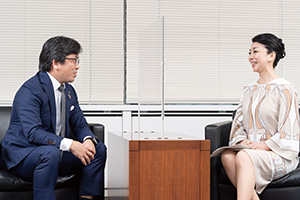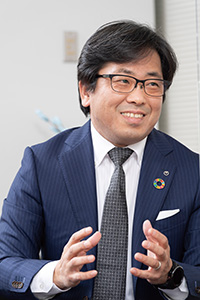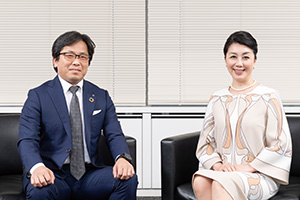Provide solutions that use big data related to medical and healthcare by using the NTT Group’s technology
—You have become president of two companies, NTT Life Science and Prime Research Institute for Medical RWD. Could you tell us about the establishment and mission of these companies?
The two companies will develop platform businesses that use big data in the medical and healthcare field. NTT Life Science is a wholly owned subsidiary of NTT, and Prime Research Institute for Medical RWD (PRiME-R) is a joint venture between Kyoto University and NTT.
Social security expenditures account for 30% of Japan’s national general-account budget for fiscal year 2021. Projections of the working-age population and medical benefits suggest that social security expenditures are expected to continue to increase as the birthrate declines and the population ages. The national medical expenditure totaled 42.3 trillion yen in fiscal year 2016, of which general medical treatment fees were 30.2 trillion yen (lifestyle-related diseases accounted for 10.4 trillion yen, or 35%). Moreover, life expectancy is 80.98 for men and 87.14 for women, but healthy life expectancy is 9 to 12 years lower than life expectancy.
These figures clearly show that Japan is facing social issues of declining birthrate and aging population, increase in medical expenses, decrease in working-age population, increase in lifestyle-related diseases, and the gap between life expectancy and healthy life expectancy. To address these issues, it is important to raise individual health awareness, extend healthy life expectancy through the prevention, early diagnosis, and treatment of diseases, and alleviate concerns about medical and nursing care costs in old age. Companies are also required to promote corporate health management, which is the strategic implementation of health management for employees from a management perspective to improve productivity and reduce medical costs.
However, it can be inferred from the aforementioned figures that few people fully understand their own health risks and think of them as their own problems. Even if they undergo annual health checkups, few people continuously take care of their health after receiving the results of those checkups. Although companies know the importance of corporate health management, they have not devised any concrete measures, and the data acquired from annual health checkups are not fully used. To rectify this situation, we will provide solutions that use big data related to medical and healthcare by using the NTT Group’s information and communication technology (ICT).

—Tell us in detail the significance, value, and prospects of the entry of the NTT Group into the medical and healthcare field.
The strength of the NTT Group is its ICT, and the group is able to create new value by making use of a variety of data. For example, the NTT Group has adopted the slogan “Your Value Partner” as its group vision, and together with its partners, the group aims to address social issues through its business activities. By accumulating and applying a wide variety of data by leveraging ICT to improve existing systems and build and introduce new systems, technologies, and services, the NTT Group aims to create a Smart World within which we can solve the numerous problems facing society and create a better living environment. NTT’s Innovative Optical and Wireless Network (IOWN) initiative aims to build an innovative network and information-processing infrastructure that overcomes the limitations of conventional infrastructures.
As one of those initiatives in fields related to healthcare, the NTT Group in November 2020 announced its Medical and Health Vision to contribute to the future of medical care through which people will become healthier and have hope for the future. Digital Twin Computing (DTC), which is a component of IOWN, is a key technology of making this vision a reality. By applying DTC, each person’s mind and body can be precisely mapped (i.e., a bio-digital twin (BDT)), and the BDT is used to predict the future state of people’s mind and body. To implement this vision and develop medical and healthcare-related business, NTT established two strategic subsidiaries, which are our companies.
I want to meet the enthusiasm and expectations of people for creating a new market
—Tell us about the specific initiatives of the two companies.
From the perspective of preventive medicine, NTT Life Science will provide services to people who have not yet become ill, while PRiME-R will provide services to those who are outpatients and entered the treatment phase.
NTT Life Science is working on “Genovision,” which is a service that supports corporate health management by proposing preventive measures and healthy behaviors by cross-checking genetic data from genetic tests against annual health-checkup data (test and medical-consultation results) acquired from companies. It is widely recognized that environmental factors such as lifestyles have a greater effect on the developing of many diseases than genetic factors. Accordingly, by understanding the physical constitution and the risk of diseases developing in the future on the basis of the genetic information, which is often referred to as the blueprint of the human body, we hope to be able to encourage people to review their lifestyles.
PRiME-R provides a service using CyberOncologyTM, which is an input support system for using various types of information (real world data (RWD)) in clinical settings such as handling electronic medical records (EMRs). The context behind this service is the current situation in Japan, where clinical information, such as EMRs, is not being fully used. RWD, including EMRs, is attracting attention for its use in medical research, clinical research, and development of pharmaceuticals and medical devices as well as daily diagnostic support for doctors. Current EMRs, however, are created as simple electronic recording media, and since a large amount of data is described and recorded freely by doctors on such media without being systematized, it is difficult to use such data for data analytics.
With this situation in mind, we built a system that supports the input of data to EMRs. The system uses a pull-down-menu format that allows users to select and enter standardized medical information from a list and store the input data in a systematized manner. The introduction of this system will also reduce labor for tasks such as registration of clinical information for the Center for Cancer Genomic and Advanced Therapeutics (C-CAT). We are also planning to launch a service to provide statistical data to medical institutions, pharmaceutical companies, and other parties by statistically processing the data accumulated in the system in a manner that individual patients cannot be identified and personal information can be protected.
All these initiatives are based on unprecedented ideas, and I believe that they will lead to a reduction in disparities in medical care provided, reduction in development costs for new drugs, deterrence of medical-system collapse, and development of new treatment methods.

—Is everything going well?
NTT Life Science began providing the Genovision service in April 2020, and PRiME-R started full-scale operations at the same time, so we have just reached the one-year mark. I am grateful that 20,000 people have agreed to take the Genovision test thus far, and I hope to make 2021 a year of great progress. PRiME-R has started several joint research projects with a pharmaceutical company and medical institutions, and we hope to establish a mechanism for collecting new data.
The start of the two companies and the novel-coronavirus (COVID-19) pandemic coincided, so the employees of both companies have not been able to meet their colleagues face to face over the past year. Although both companies are still in the early stages in terms of sales, many people have shown much interest in our services. To prevent the spread of COVID-19, we are unable to visit the medical institutions, which are the customers of PRiME-R, so we are talking to them online. It is very difficult for doctors, who are users of our system, to coordinate their time with us; even so, we have been able to be in contact with doctors from all over Japan in a timely manner by taking advantage of online communications. It was a difficult situation, but it was also good for us because of the social climate in which online sales are accepted.

Enthusiasm and responsibility are required of top executives
—How do you feel as a top executive involved in various new initiatives at the new company?
I was previously working at the Research and Planning Department at NTT, where I was involved in the development of medical and healthcare businesses using the research results of NTT laboratories. At that time, I shared my awareness of issues in the medical field with executives of NTT Group companies, which was a starting point from which I could begin working toward addressing social issues in the medical field. One year has passed since we established these companies, and we are just beginning to establish their foundations; however, this is a new field, so we are confronted with various problems daily. By making decisions and establishing rules to deal with these unfolding problems, we are making steady progress toward our companies’ goals, and I feel the weight of that responsibility very strongly.
Because both companies are small, we can share awareness of problems with our employees in detail and approach them with a sense of unity. However, regardless of the size of the companies and one’s career, a top executive has a responsibility to make decisions, and I think that a vision is necessary for the success of the business. I want to develop the two companies into those that will become the foundation of the future medical and healthcare fields. I am working hard every day to meet the enthusiasm and expectations of people inside and outside the NTT Group to create new markets.
—How do you make daily judgments and decisions?
Basically, I make decisions by taking into account the effects and impact of the vision and goals we are pursuing. Since some initiatives will inevitably fail, and our business field is new, it is sometimes difficult to know what is a success and what is a failure. With this situation in mind, I place great importance on maintaining an unshakable attitude toward our vision and goals and having conversations to share our vision. The first partners in those conversations are medical professionals. We are professionals in ICT but amateurs in the medical field, so it is essential for us to keep abreast of the most-advanced medical care, keep in touch with top doctors, and communicate with other professionals in the field. I am constantly striving to gain knowledge through dialogues with the professors from the University of Tokyo and Kyoto University with whom we are collaborating and to understand the style and culture of the field. There are many regulations in the medical field, and there are values that non-experts do not understand. The higher the hurdle, the more interesting it is to challenge, and the more rewarding it is to overcome.
I believe that it is impossible to move business development or anything forward without enthusiasm and motivation, and strategies and tactics should follow them. In the 27 years since I joined NTT, I have learned the importance of being independent and taking responsibility while doing various jobs in different fields. It was not until I was engaged in business development at NTT’s Research and Development Planning Department that I became strongly motivated to address social issues in the medical and healthcare field. After I developed my own vision in this field, I started a challenge to fulfill the vision, and the establishment of the two companies has paved the way for that challenge.
Meetings with our collaborating professors are refreshing and always inspiring, and preparing for those meetings is a pleasure. Discussing solutions to social problems with executives from companies, doctors from medical institutions, and people from consulting companies is valuable for me, and I am grateful for their support and enjoying working with them. Both companies have just started to move from the starting line, and we will aim for our goals while further enhancing our resources, such as knowledge, experience, services, and personnel. I am not in a position to say anything outstanding because I have no track record yet; all the same, I will keep in mind my responsibility and the speediness of decisions while not forgetting the feeling of gratitude.
—Please give a few words to our researchers and engineers.
I want you to engage in research and development that benefits society. Our business includes data analytics, utilization, and collection as well as the trending fields of security, artificial intelligence, and data science. Without strengthening our research and technologies in each of these fields, we will not be able to win in the global market. Therefore, take the challenge of pursuing cutting-edge technology with enthusiasm and be confident in your research theme. We want to promptly implement your achievements in society, so let’s work hard together toward that goal.
